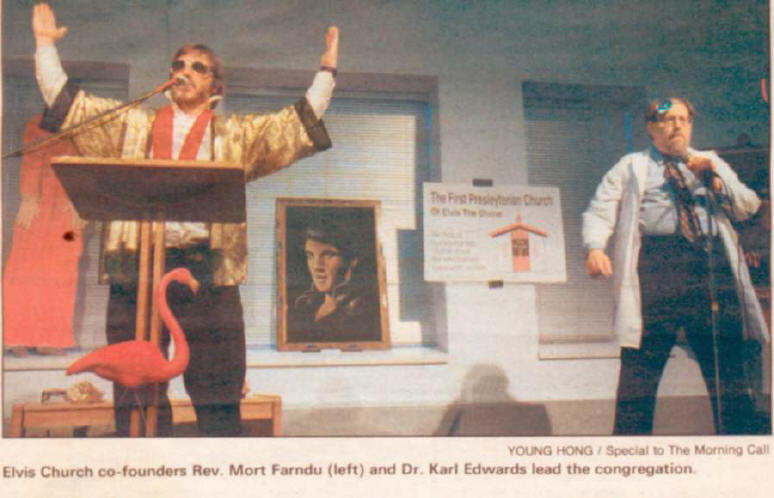
Saint Elvis the Divine

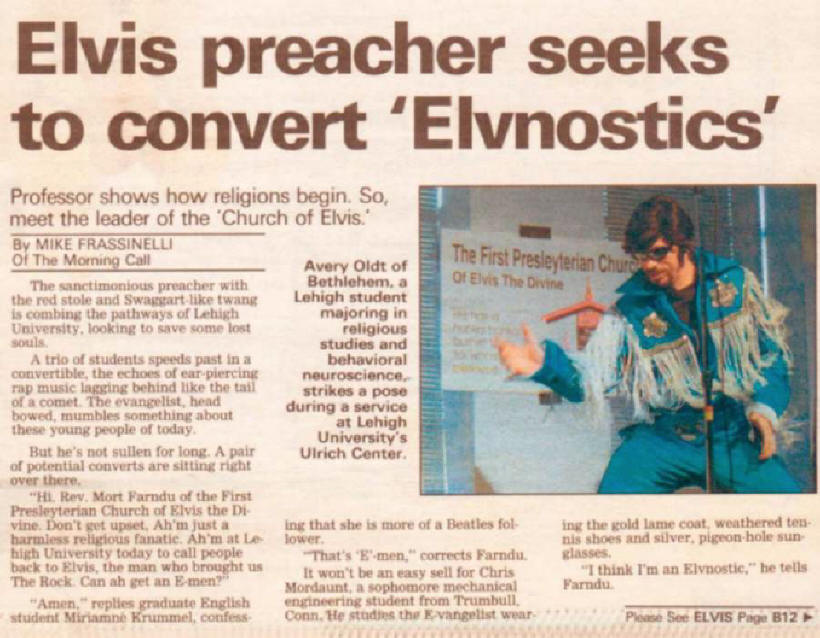
|
|
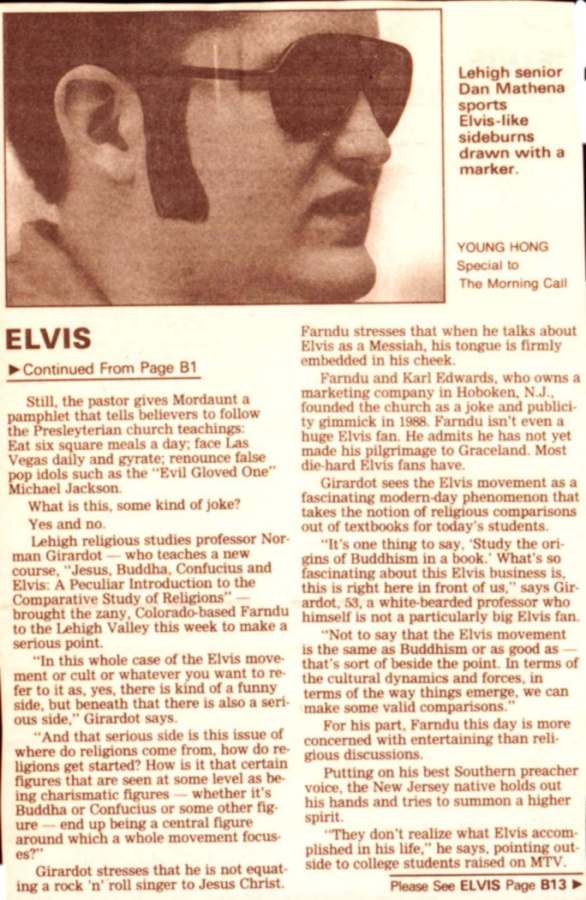
|
|
|
|
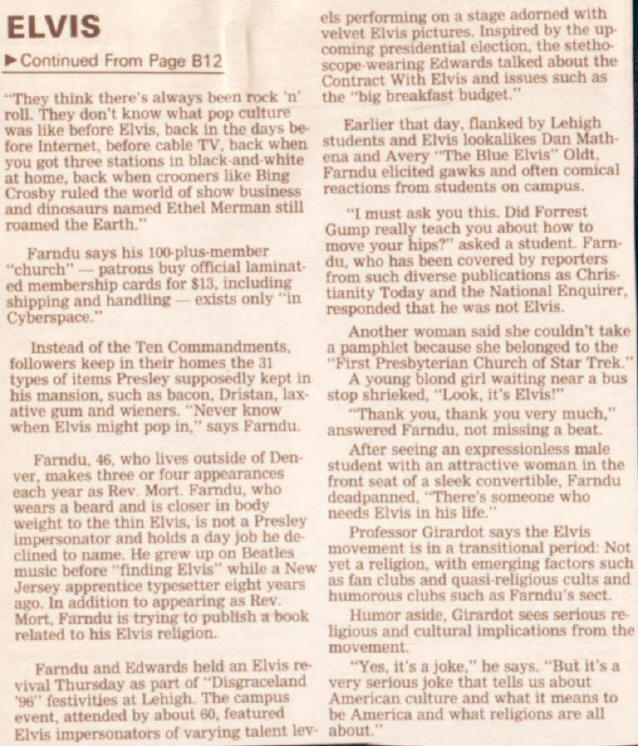
|
|
|
|
|
"Only fans understand it. If you're not a fan nobody understands it. No matter how depressed --I can get so depressed and I can put on a song and just get brought up. Anytime I got anything bothering me I can get in my car and turn the stereo on and listen to Elvis and just go into a world of my own and it's like he's right there singing directly to me. He's just always been there. Anytime I've ever had anything bothering me, I can always put him on -- and you always know you can -- it's like he's always there to solve everything." --Bobbie Nowell (1987)
|
|
The First Preslyterian Church of Elvis the Divine
|
|
"This will go on indefinitely. People like myself who have children -- my children are all grown up but still, they were raised with Elvis and they're beginning more and more to understand what Mom feels. I now have a little granddaughter, 3½ years old, and she definitely knows who Elvis is and you know, I want her to know. I don't want to push it on her but I want her to understand what he was about and what he meant to me and I just feel like with that, in time, she's going to appreciate him too, and hopefully she'll become a fan and maybe her children will become fans. He's going to go on forever. I just really feel that the feelings that we have for Elvis now are so strong that it's got to go on from one generation to another." --Jane Anderson on her 18th visit to Graceland in (1988)
|
|
Charles Bryant Owens ( n.d.) in his article, "Preslianity: Religious Devotion to Elvis Presley in America" (The Wittenberg Review: 101-118), indicates that the individuals expressing religious devotion to Elvis are mostly white and are confined to the lower middle class or working class. Owens quotes the Reverend Robert D. Martin on the rising devotion to Elvis.
|

|
The devotion to Elvis is illustrated by Sherry, Jimmy and their daughter Jennifer, who was dying from the complications of Down's Syndrome. All three were ardent Elvis fans. They listened regularly to Elvis' music at home and frequently watched Elvis movies. It was not long after Elvis died that Sherry and Jimmy had to take Jennifer to the hospital. Sherry describes Jennifer's last moments (Owens: 110-111; quoted from Raymond A. Moody, Elvis After Life: Unusual Psychic Experiences Surrounding the Death of a Superstar. Atlanta: Peachtree. 1987: 54-55):
|

|
Jimmy expressed the effect that the experience had on him.
|

|
A further illustration contained in Moody's book concerns the experience of Hilda Weaver, a clinical psychologist. Weaver had met Elvis when she was a little girl and had fantasized about marrying Elvis for several months after that event. However, although she owned several Elvis albums as an adult, she never considered herself an ardent fan. She saw herself as a "serious, academic type" who was never interested in paranormal experiences. Owens (p. 111) describes Weaver's experience (based on Moody's account).
|
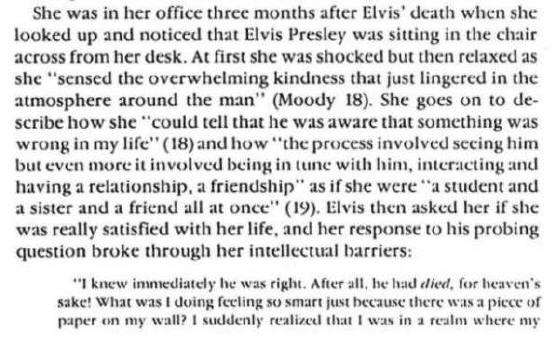
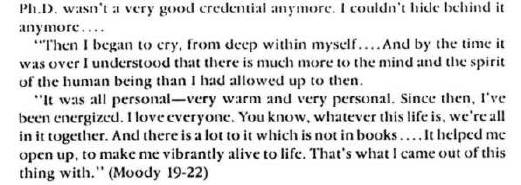
|
Owens states that Hilda Weaver had a spiritual conversion experience. Such experiences are common among those, for example, who call themselves "Born Again Christians". St. Paul, the early Christian evangelist, had such an experience on the road to Damascus, as did many other saints in the Christian pantheon.
|
|
All of this raises an interesting question: is Preslianity a religion? Martin Southwold (1978) in his article "Buddhism and the Definition of Religion" (Man 13: 362-79), discusses the attributes that distinguish religion from other social institutions and practices. Southwold states that a single definition of religion is not possible, because "a religion is not a homogeneous system responding to any single need or inclination. . . . Religion is polythetic because of the diverse origins of the forms of behavior which constitute it (p. 371)." Southwold then lists twelve (12) attributes of religion, which he states are very strongly associated with one another in human societies around the world. These attributes are:
1. A central concern with godlike beings and men's relations to them.
2. A dichotomization of elements of the world into sacred and profane, and a central concern with the profane.
3. An orientation towards salvation from the ordinary conditions of worldly existence.
4. Ritual practices.
5. Beliefs which are neither logically nor empirically demonstrable or highly probable, but must be held on the basis of faith.
6. An ethical code, supported by such beliefs.
7. Supernatural sanctions on infringements of that code.
8. A mythology.
9. A body of scriptures, or similarly exalted oral traditions.
10. A priesthood, or similar specialist religious elite.
11. Association with a moral community, a church.
12. Association with an ethnic or similar group.
A specific set of beliefs and practices does not have to possess all of the above attributes on order to qualify as a religion, according to Southwold. Rather, our confidence in calling a particular set of beliefs and practices a religion is simply increased by the number of these attributes it possesses.
Based, then, on Southwold's list of attributes, might not Preslianity qualify as a religion? Indeed, at what point does a set of beliefs and practices become a religion? How many of the above attributes must it possess? Do Judaism, Buddhism, Islam or Christianity possess all of the above attributes? If not, would we refuse to call them religions? If so, did they possess all of the attributes immediately, or did they acquire many of the attributes over time? Furthermore, did they emerge as full-blown religions, or did they, like Preslianity, begin as disparaged beliefs and practices associated with the more marginalized segments of the societies in which they originated? Didn't they all become accepted as legitimate religions only later when they became linked to dominant political systems?
|
|
|
|
|
|
|
|
|